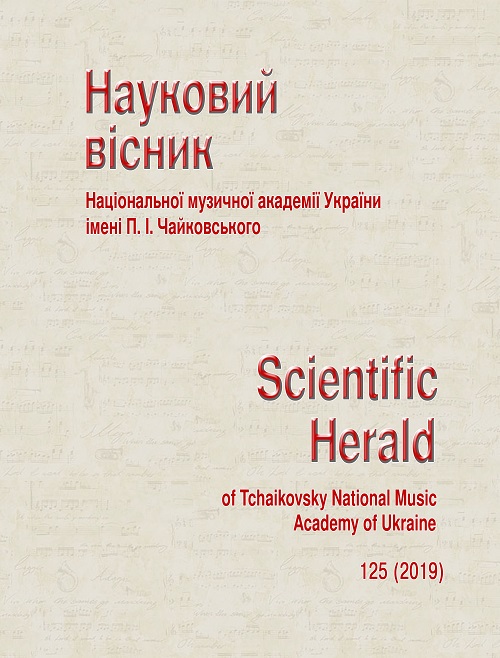Conductor's Component of Mikhail Pletnev's Style of Musical Creativity
DOI:
https://doi.org/10.31318/2522-4190.2019.126.197971Keywords:
style of musical creativity, conducting creativity of M. Pletnev, piano creativity of M. PletnevAbstract
Many musicologists have been researching the question of the performance style and the main factors, influencing its formation. At the same time, the instrument and the performer’s personality correlation are not as significant. As a result, the correction of the parameters of the individual style in diverse conditions (for example, when one musician uses various instruments) is still not sufficiently examined. Although the professional performers who can play several instruments are quite rare nowadays, this way of performance style studying seems significant for the contemporary history of art.
Mikhail Pletnev is one of the few contemporary musicians whose personality type can be described to the full as a versatile musician. M. Pletnev started his career as a pianist and successfully became famous, but after a while he found himself in a completely different role. A holistic understanding of M. Pletnev's music works style is impossible without making an analysis of the interaction and interrelation of his main activities — a composer and pianist images, their influence on his conductor and interpreter style formation, development and evolution. All the aforementioned determine the relevance of our research.
The purpose of our research lies in the study of the musician's individual style parameters: which of them help him retain the integrity of musical style, and which had to be modified.
The methodological basis of the research consists in a comprehensive approach comprising the interpretational and stylistic methods.
Main results. Relying on the existing typologies of performance styles, we can notice that the style of M. Pletnev’s performance varies depending on the type of his activity. He sets himself different super-objectives in the pianist or conductor roles. M. Pletnev in the pianist role is represented as an intellectual whose super-objective is to comprehend. The reluctance to communicate with the audience and the extreme reticence in conversations with journalists define M. Pletnev as an introvert. These conclusions were made solely on his pianist image, and they are extremely different from the image of M. Pletnev at the conductor's stand.
M. Pletnev has never been willing to teach, so he finds the possibility of self-realization, transmission of knowledge and creative experience in his own orchestra. He allows himself to reveal fairly romantic traits at the conductor's stand: assertiveness, impulsiveness, inner energy and strength. Working with a large number of people in an orchestra requires the emotional fullness of the communication process, a prerequisite of productive interaction. Therefore (according to D. Rabinovich) we can assume the dominating idea of his conductor's work is the desire to convince.
Conclusion. Transformation, integration, and mutual exclusion of these two images — M. Pletnev-pianist and M. Pletnev-conductor — continue over the entire creative life of the musician. His brainchild that became his laboratory for creative researches has brought M. Pletnev those missing elements of the creative puzzle that the piano alone was unable to provide. Nowadays, M. Pletnev creates piano programs again, which are a smashing success with the audience and critics alike. However, he prefers to call himself a musician, rather than pianist.
Downloads
References
Pershyi kanal. TV projects. Issue by Mikhail Pletnev. Iinterview by V. Pozner. [Teleproekty. Vyp. Mihail Pletnev. Interv'ju vzjal V. Pozner]. Available at: https://pozneronline.ru/2019/08/26091/ (Accessed 05 Nov. 2018). [in Russian].
Pletnev, M. V. (2013). Oil or Tchaikovsky? What worries Mikhail Pletnev in Russian life and culture. Interview with Irina Muravyeva. [Neft' ili Chajkovskij? Chto volnuet Mihaila Pletneva v ros. zhizni i kul'ture. Iinterv'ju vzjala Irina Murav'eva]. Rossijskaja gazeta. September 13 [in Russian].
Predlohov, V. At the concert by Nikolai Lugansky at KBH [Na koncerte Nikolaja Luganskogo v BZK]. Available at: https://www.belcanto.ru/14052302.html (Accessed 15 Mar. 2019). [in Russian].
Rabinovych, D. A. (1979). Performer and Style [Ispolnitel' i stil']. Elected Art. Issue. 1. Piano stylistic problems [Problemy pianisticheskoj stilistiki]. Moscow: Sovetskiy kompozitor [in Russian].
Rakhmaninov, S. V. (1992). Memories recorded by Oscar von Riesemann. [Vospominanija, zapisannye Oskarom fon Rizemanom]. Afterword, English translation, comments by V. N. Chamberjee. Moscow: Raduga [in Russian].
Sydorenko, O. Yu. (2018). Individual Performing Style in the Ensemble Music System (on the Example of a Chamber Violin Sonata). [Indyvidualnyi vykonavskyi styl v systemi ansamblevoho muzykuvannia (na prykladi kamernoi skrypkovoi sonaty)]. Diss. ...Cand. Degree of Ph.D. in Arts : 17.00.03 Musical Arts. Kharkiv: Kharkivskyi National Kotliarevsky University of Arts. [in Ukrainian].
Sukhlenko, I. Yu. (2011). Performing style of Vladimir Gorovits in line with the development of romantic tradition. [Ispolnitel'skij stil' Vladimira Gorovica v rusle razvitija romanticheskoj tradicii]. Diss. ...Cand. Degree of Ph. D. in Arts: 17.00.03 Musical Arts. Kharkiv: Kharkivskyi National Kotliarevsky University of Arts. [in Russian].
Tokareva, L. Kh. (2009). Musical discoveries by Mikhail Pletnev [Muzykal'nye otkrytija Mihaila Pletneva]. Moscow: Vesti [in Russian].
Downloads
Published
How to Cite
Issue
Section
License
Our journal abides by the CREATIVE COMMONS copyright rights and permissions for open access journals.
Authors, who are published in this journal, agree to the following conditions:
The authors reserve the right to authorship of the work and pass the first publication right of this work to the journal under the terms of a Creative Commons Attribution License, which allows others to freely distribute the published research with the obligatory reference to the authors of the original work and the first publication of the work in this journal.
The authors have the right to conclude separate supplement agreements that relate to non-exclusive work distribution in the form in which it has been published by the journal (for example, to upload the work to the online storage of the journal or publish it as part of a monograph), provided that the reference to the first publication of the work in this journal is included.




